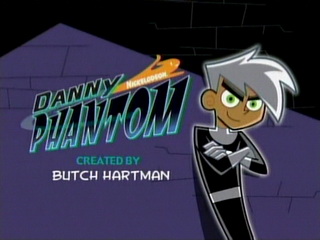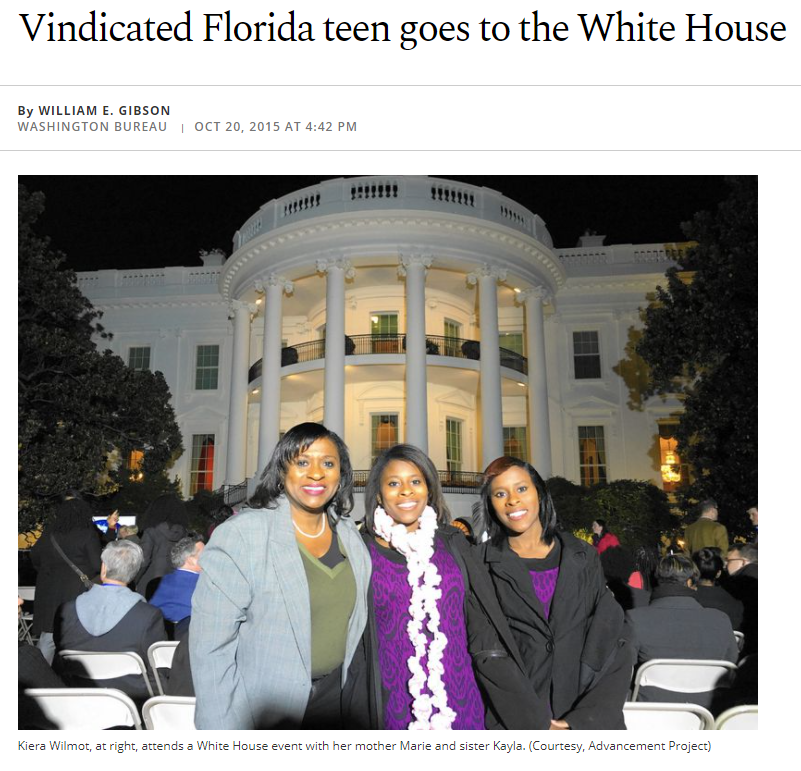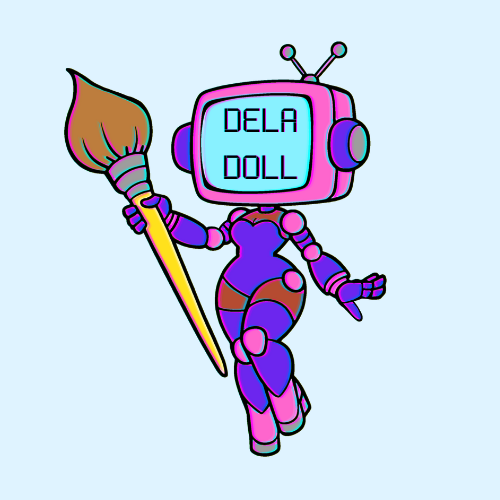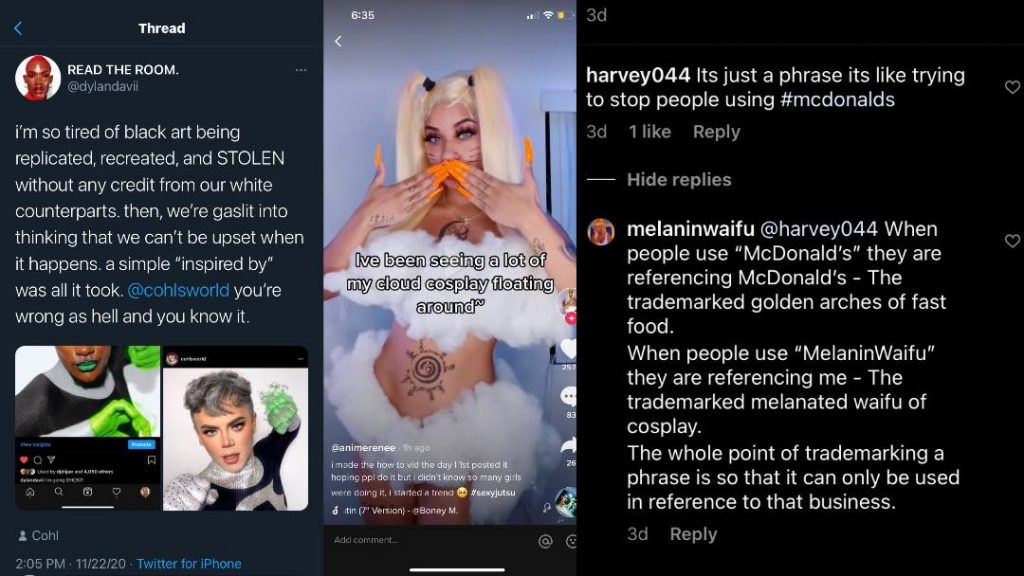I’m breaking my self-imposed “don’t give opportunistic clout chasers attention on your blog” rule to share some thoughts and experiences concerning the sudden influx of newbie cosplayers (or individuals who get really angry if you call them cosplayers despite the fact that they are participating in cosplay) causing quite a stir on social media. These individuals tend to follow the same pattern of behavior:
- Decide to enter the cosplay community in some capacity.
- Declare yourself the owner/originator of a commonly used phrase or character
- Declare that anyone else who has used/cosplayed said phrase or character is copying you. Deflect when people point out that not only was your idea not as original as you hoped, but that it is normal and common for cosplayers to cosplay the same characters, use similar hashtags to promote themselves, etc.
- Profit???
This frustrating phenomenon has become a common topic of discussion among the cosplay community, with many “veteran” cosplayers feeling torn because while they don’t want to gatekeep or come off as exclusionary, it is disheartening to see people negatively warping the perception of cosplay and cosplayers as a whole with negative and opportunistic behaviors that end up discouraging genuine participation and interest.
I think it’s great that more people are becoming interested in cosplay, and it’s not secret that it has become something of a lucrative industry in its own right. However, there’s something to be said for people who use cosplay as a means to an end in order boost themselves on social media without recognizing what it is or knowing anything about the community. You can’t be a newcomer, do zero research, and decide to make the rules or rewrite history, disrespecting the community you’re relying on to fulfil your influencer fantasies in the process. Imagine walking into a meeting of chemists and announcing that you are an expert, practically the father of modern chemistry, because you once did the “baking soda and vinegar volcano” experiment in 3rd grade. When the chemists are justifiably confused and attempt to set the record straight, you lash out. Is that reasonable? No, of course not.
In fact the issue of people cosplaying the same characters has been addressed many times over. It’s even a running joke that you’ll see 100 Harley Quinns, Deadpools, Spidermen, etc at conventions. Most of us are excited to see someone cosplaying the same characters that we love and enjoy.
That’s why it’s so bizarre and irritating to see people hopping in, declaring themselves experts, and taking credit for things they did not create and know nothing about, all while throwing out harmful and unfair accusations in an attempt to make a name for themselves. If this sounds far-fetched, allow me to give you a few examples of this that have taken place in the span of just a few months.
The Danny Phantom Fiasco – November 2020
The events are summarized pretty well in the tweets embedded below; however, I’ll recount them here as well. Aspiring makeup influencer Dylan Davii took to Twitter to accuse fellow makeup artist, Cohl Woolbright, of stealing his “Black art.” The art in question was a cosplay of Danny Phantom. For those who don’t know, Danny Phantom is a cartoon that premiered in April 2004. The title character is a fairly popular character among cosplayers, who have been cosplaying him long before either Dylan or Cohl Woolbright decided to join in.

When people in and/or familiar with the cosplay community (myself included) pointed this out, Dylan and his followers berated them with insults while ignoring the truth of the matter. Initially, I assumed that Dylan was merely unfamiliar with the fact that a lot of people cosplay the same characters, and unless you have completely original concept art, cosplaying Danny Phantom more or less as he was originally designed is not theft. I pointed this out in a Twitter thread after witnessing him and his followers harass some of my peers.
As a result of my thread, he called me a coon for politely pointing out that his accusation of copying was unfounded with evidence of other people having cosplayed Danny Phantom years prior. It was not lost on me that he attempted to weaponize and manipulate the concept Black solidarity against another Black person in an attempt to deflect. Being accused of being a racial “sellout” when I’ve always tried to promote inclusivity and diversity in the cosplay community, addressed actual instances of racism and discrimination, and often taken heat from racists and trolls for doing so, was very odd and a bit insulting.
When looking over the event, it does feel as though Dylan intentionally orchestrated this in order to gain followers and recognition. If he had been receptive to people telling him that someone doing the same cosplay as you is not a case of art theft, it would be easy to believe he was simply mistaken. However, I personally feel he made the accusation in bad faith from the beginning. Moving on…
The Sexy Jutsu Cosplay Incident – February 2021

In February 2021, TikTok influencer AnimeRenee accused people of stealing and copying her “cloud cosplay,” going as far as to ask viewers to point out anyone else cosplaying the character. AnimeRenee did not invent this character, and was actually referring to other people who cosplaying Naruto’s “Sexy Jutsu” form, who first appeared in Volume 1 of the Naruto manga in 1999, as well as in 2002 in the Japanese anime debut (and then in 2005 in the English debut). A quick Google search will reveal that, similarly to the abundance of Danny Phantom cosplays, there are hundreds of “Naruto Sexy Jutsu” cosplays that existed far before (I’m talking years) AnimeRenee decided to enter the scene.
Once again, there appeared to be a relative newcomer to cosplay scene, who decided to ignorantly stir up trouble by claiming ownership of a character that existed over 20 years before. After facing backlash from the community, because I imagine that people don’t really take kindly to being unjustly accused of theft or “copying”, she then attempted to backtrack and say that she started the “trend” of “cloud cosplay.”
Not unlike Dylan’s response to cosplayers and reasonable individuals pointing out that she created neither the character nor the trend, Renee responded by harassing, insulting, and berating them.
She also mentioned an instance of her legitimately stealing an original concept from a cosplayer in an attempt to deflect and project, only serving to out herself as the type of “clout chasing” thief she accused others of being, as detailed in the following video:
If this isn’t enough to illustrate the growing problem of people attempting to turn the cosplay community and cosplay itself into a toxic competition as opposed to a shared hobby (and we already had enough of that before aspiring influencers decided to create drama, but I digress), here is one last example.
The Curious Case of the Kiera Wilmot – “The Trademarked Melanated Waifu of Cosplay”
The dust had barely settled on the “Sexy Jutsu” cosplay fiasco when Kiera Wilmot, who goes by “Melanin Waifu” on social media, decided to enter the fray. Kiera recently began commenting on the social media posts of Black and Brown cosplay girls who used the relatively common “melanin waifu” (#melaninwaifu) tag on their content. She asked them to stop using the tag, claiming that she created it, and pointing out that she filed a trademark for it. She accused others who used the tag of infringing upon her brand and trademark, much to the confusion of the accused, who had never heard of her or her brand prior to the encounter.
Aside from the fact that you cannot stop others from using a hashtag, even if you have a trademark, Kiera failed to address anyone who pointed out that the tag existed before her social media accounts were even created. Instead, she resorted to ableism (as seen in the tweet embedded above) and deflection, repeatedly stating that she was the creator of the tag, that others were not allowed to use it, and that they were only using it to profit off of her “cosplay brand” that she claims she created in July of last year (although use of the term predates July 2020).
Like many others who have been following this latest instance of “cosplay copycat” accusations, I had not even heard of Kiera prior to this incident (or so I thought, but we’ll get to that in a moment). How can people try to “profit” off of a brand or individual they did not even know existed?
Wanting to know more, since Kiera wasn’t very keen on providing any evidence of her actually cosplaying or having a brand/social media notable enough for others want to piggyback off it, I decided to conduct my own research. It is true that Kiera filed for a goods and services trademark of the term “melaninwaifu” in October 2020, a fact easily verifiable by conducting a search on the US Patent and Trademark Office’s website. I also noticed that her sister was on Twitter speaking in her defense, claiming that she’d been using the tag for “years” on social media, contradicting Kiera’s own claim that she’d only just “created” it in July 2020.
I couldn’t find evidence of her having used the tag for years, or of her having cosplayed for years. I did find an Instagram and subreddit, created in August and September 2020 respectively, both run by Kiera under the name “MelaninWaifu”, which coincides with her claim that she began cosplaying and using the term around summer of last year, as opposed to, you know, years. Meanwhile, as previously stated, other Black cosplayers have been using the term for years.
I also noticed people on Twitter pointing out how Kiera claims that she is not Black, but Asian (as though people can’t be both?), despite using a tag and branding common among Black cosplayers and nerdy influencers.
Melanin is simply a naturally occurring brown pigment in the skin, hair and eyes, so anyone can have melanin, but the term is often associated with, and most often used by, the Black community on social media. I wondered if Kiera was a grifter attempting to profit off of proximity to blackness and cosplay, or if she was, for lack of a better term, a self-hating weeb. I googled her name and found that she not only identified as Black as recently as 2019, but she’d also made headlines in 2014 and 2015 for an unfortunate incident that occurred when she was in high school.
It turns out that Kiera made national headlines over half a decade ago for being unfairly arrested, expelled, and threatened with felony charges over conducting an unauthorized science experiment on school grounds at her then high school. The incident was resolved when charges were dropped, and she even ended up getting to go to the White House as a result of the controversy.

I’m sincerely happy that Kiera did not face jail time or suffer permanent damage to her future as a result of the incident that happened when she was just a teenager; however, what stood out to me was that Kiera is referred to as Black/African-American in all of the articles that come up about her. Further verification of this can be found on her other Twitter profile, created in 2016. Here, Kiera appears to have been trying her hand at being a model and lifestyle influencer. She tagged multiple posts with “Black”, “BlackHistory”, “BlackAndProud” and other tags associated Black people on social media. Interesting.

This is significant because it is an indicator of Kiera being a liar, and a very brazen and very bad one at that. I’m only speculating here, but my theory is that Kiera envisions herself as a crafty businesswoman. Lying about her race and ignoring antiblackness from followers when she was still #BlackAndProud just two years ago? Well, that’s probably just “rebranding” to her. She suffered something unfortunate that ended up putting her in the spotlight. Now, years later, she’s intentionally gunning for the spotlight, and what better way than to cause drama online by entering an increasingly profitable community and claiming ownership of something was never truly her own? Clearly, judging by the growing number of individuals doing just that, it’s not unheard of.
Closing Thoughts
As a cosplayer, I find this phenomenon equal parts amusing and frustrating. While I’m not personally discouraged, I do feel for the people who may decide they shouldn’t give cosplay a try, or should just quit and give up on cosplay due to bad actors who seek to use it as a vehicle for internet fame without bothering to learn anything about it.
If you want to get into cosplay (or any hobby, subculture, or niche market), no matter what the reason, the very least you can do is respect those around you, acknowledge those who came before you, and do your research before throwing around accusations.
DeLa Doll is a multifaceted artist, writer, and creator with a passion for bold self-expression. With a background in professional writing, nail artistry, and makeup, she brings a unique perspective to beauty, creativity, and storytelling. As the driving force behind DeLa Doll, she blends artistry with authenticity, sharing her journey of entrepreneurship, self-discovery, and growth. Whether crafting luxury press-on nails, exploring media through a critical and creative lens, or documenting her evolving artistic vision, DeLa Doll invites her audience into a world where imagination meets intention.


![[DeLa Doll] Ambassador Scams: How to Spot Them](http://dela-doll.com/wp-content/uploads/2021/01/143883333_112304177407557_2799363296283192457_n-80x80.jpg)
